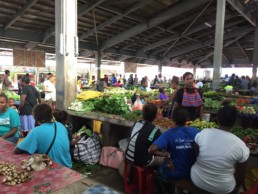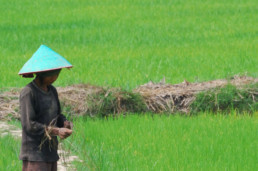Guidelines and training package on high impact nutrition interventions in Kiribati, Solomon Islands and Vanuatu
2018/Pacific/UNICEF
Drawing on the work in Timor-Leste, NutritionWorks developed a set of national guidelines, training materials, and job-aids for high impact nutrition interventions in Kiribati, Solomon Islands and Vanuatu. NW conducted a Training of Trainers and supervision of cascade training in all three countries.
World Vision nutrition within Child Health Now Campaign 2011
2011/Global/World Vision
NutritionWorks led a review process of the operational considerations responding to various global initiatives promoting the scaling-up of nutrition programming and care within the coming 5 years. The review consisted of an assessment of current literature and global positioning, key informant interviews , and field visits were conducted to one African (Ghana) and one Asian (Cambodia). A final report provided recommendations to inform national and international operating agencies and practitioners, the private sector as well as institutional donors, on how to examine and improve the operational environment in order to have the greatest impact on the scale-up of nutrition programming to reduce the current global levels of undernutrition.
World Vision Scoping Study: Developing a programme and policy strategy for nutrition-sensitive agriculture and food security
2015/Global/World Vision
NutritionWorks conducted a scoping exercise for World Vision to provide recommendations on a programme and policy strategy for integrating nutrition into agriculture and food security. The work took into account the global nutrition-sensitive landscape, including current evidence, gaps and funding patterns while simultaneously considering, World Visions current nutrition-sensitive programming, lessons learned and challenges and comparative advantage.
Operational factors in the integration of nutrition into agriculture and livelihoods programmes in Zimbabwe
2017/Zimbabwe/World Vision
NutritionWorks conducted a case study as a learning exercise for World Vision, partners and a wider audience of practitioners, researchers and decision-makers. It shows that there are many opportunities and challenges to design, implement and assess multi-sector programmes for nutrition. Establishing clear objectives, a theory of change and a monitoring framework involving not only programme stakeholders but communities, government and the private sector are important. Multi-sector programmes are challenging due to their traditionally separate sectors. A good approach is to coordinate at all levels, understand the context, assess assumptions, agree objectives, be participative, harmonise training materials and give attention to any unintended consequences. A fully mainstreamed gender component is essential to optimise the pathways from agriculture to nutrition. Targeting farmers with the greatest capacity for increasing agricultural productivity could exclude the poorest and most vulnerable, making nutrition objectives elusive. A practical guide to implement and assess multi-sector programmes for nutrition under the real constraints experienced by the implementers is needed and further case studies would help achieve this.
Discussion Paper On The Operational Factors Influencing Nutrition-Sensitive Agriculture
2015/Global/World Vision
On behalf of World Vision, examining what are the operational opportunities and challenges that programmes face in seeking to make agriculture and livelihood programmes nutrition- sensitive? What lessons can be drawn from practical experience? What comparisons can be made between programmes that are co-located and those that are integrated?
The Scaling Up Nutrition (SUN) Movement: examining progress and partnerships
2017/Zambia, Kenya, Bangladesh/Center for Strategic and International Studies
CSIS Global Food Security Project launched a new report authored by NutritionWorks, What can the United States learn from the Scaling Up Nutrition (SUN) movement? Examining country leadership in Zambia, Kenya, and Bangladesh. Drawing from SUN progress observed in three Feed the Future countries, the report furnishes recommendations for the U.S. government to maximize returns on substantial nutrition investments through the SUN Movement. It highlights the importance of partnership and alignment with host countries and other donors to collectively tackle the global burden of malnutrition.
Review of the Minimum Reporting Package for Save the Children
2013/Global/Save the Children
The Minimum Reporting Package was reviewed on the request of Save the Children. This was conducted in conjunction with Valid International.
Nutrition programme review DFID Pakistan
2011/Pakistan/DFID
This report describes how the programmes of DFID in Pakistan could contribute directly and indirectly to improving the nutritional status of the population. The few data available for Pakistan before the recent emergency are summarised and some data on factors associated with stunting, underweight and wasting are presented. The guiding principles of DFID’s nutrition strategy are briefly introduced in the context of Pakistan and some comments are made on the likely indicators to be used to assess the effectiveness of programmes. The UNICEF conceptual framework is then used as a tool to analyse how almost all the current DFID programmes could influence the basic or underlying causes of malnutrition and could have nutritional consequences.
The report discusses the difficulties in estimating the effects of programmes on nutritional outcomes unless they directly affect the immediate causes of malnutrition. Some possible additions to DFID programmes are suggested and the purchase costs are estimated. Finally some possible risks or threats to the success of DFID programmes in Pakistan are raised.
Review of UNHCR Emergency Response in Dollo Ado
2011/Ethiopia/UNHCR
A review was conducted of the UNHCR response to the Dollo Ado emergency in Ethiopia.
Urban malnutrition: a review of food security and nutrition among the urban poor
2012/Global/Save the Children
NutritionWorks has conducted a review on 'food security and nutrition among the urban poor' on behalf of Save the Children. This work was carried out by Lili Mohiddin, Laura Phelps and Tamsin Walters. The project examines objectives of urban programming, review published literature and unpublished documentation from operational organisations as well as accessing internet-based discussion forums to inform the review.


